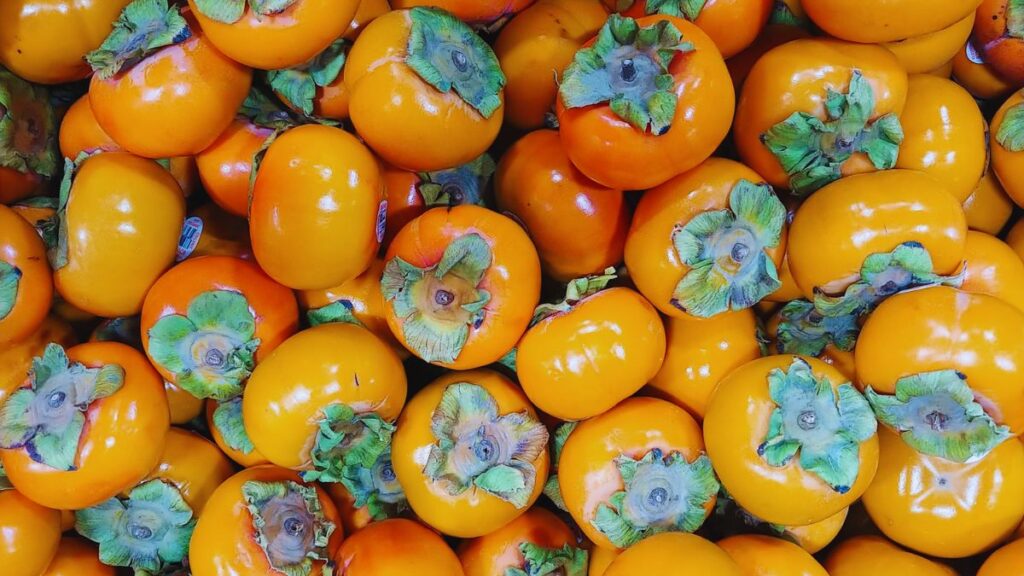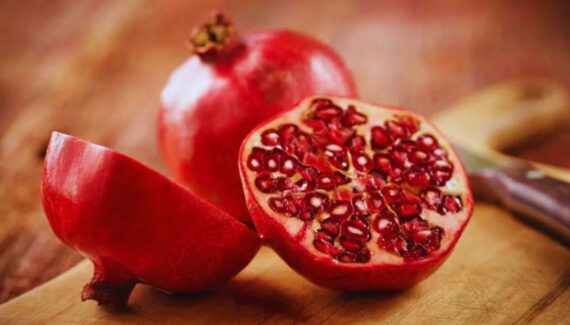Winter diets tend to be repetitive and low in fresh fruits, but persimmons ripen just when your body needs a natural defence system the most.
Their deep orange hue is more than just eye-catching — it signals high levels of beta-carotene, which the body converts into vitamin A. This nutrient is vital for healthy skin, vision, and immune function. During the cold season, reduced sunlight exposure often leads to a drop in energy and immunity. Persimmons counter this by delivering a powerful mix of antioxidants that help your cells fight cold-induced stress and pollution-related damage.
In addition to beta-carotene, persimmons are packed with vitamins C and E. Vitamin C strengthens your immune system, supports collagen production, and aids wound healing, while vitamin E keeps your skin hydrated and supple in dry winter air. Together, these nutrients make persimmons a true superfood for seasonal wellness.
The Nutritional Powerhouse
Beneath their smooth, golden-orange surface lies an impressive nutrient profile that supports overall health. Here’s what makes persimmons stand out as a winter essential:
-
High in antioxidants: Persimmons contain polyphenols and tannins that combat oxidative stress, helping protect cells from premature ageing and inflammation.
-
Rich in flavonoids: Compounds in this fruit promote healthy blood circulation and may reduce the risk of heart disease.
-
Excellent source of fibre: Persimmons provide both soluble and insoluble fibre. Soluble fibre binds with cholesterol in the gut to lower LDL ‘bad’ cholesterol, while insoluble fibre aids digestion — particularly beneficial in winter when digestion tends to slow down.
-
Moderate in sugars: Despite their sweetness, persimmons have a moderate glycemic index, offering steady energy without sharp sugar spikes.
-
Loaded with vitamins: They are a natural source of vitamins A, C, and E — all crucial for immune function, tissue repair, and healthy skin.
-
Rich in essential minerals: Persimmons supply potassium, manganese, and copper. Potassium helps regulate blood pressure and fluid balance, manganese supports bone strength, and copper promotes energy production and brain health.
These nutrients work together to strengthen immunity, support heart health, and improve metabolism — helping you stay energized through the winter chill.

Heart Health and Metabolism
One of the most researched benefits of persimmons is their role in supporting cardiovascular health. This is particularly beneficial in winter when physical activity tends to decline, and heavier meals are more common.
- Persimmons may help lower LDL cholesterol and support healthy blood vessels, ensuring smoother circulation. Their high fibre content also assists by binding cholesterol in the digestive system, reducing its absorption into the bloodstream.
- Beyond heart health, persimmons contribute to better metabolic balance. The fruit’s compounds slow down sugar absorption, stabilizing blood sugar levels and preventing energy crashes.
- Some studies even suggest persimmon extracts may enhance insulin sensitivity, enabling the body to use energy more efficiently.
As your metabolism naturally slows in cold weather, eating nutrient-dense fruits like persimmons helps maintain energy and vitality by delivering both quick and sustained fuel.
Eating Persimmons Regularly
Including persimmons in your daily winter diet does more than just add sweetness to your plate — it actively supports your body’s defences.
- The combination of vitamin C, carotenoids, and polyphenols builds a powerful antioxidant shield that helps fight inflammation and protects against fatigue, infections, and environmental stress.
- Regular consumption may improve endothelial function — the ability of blood vessels to expand and contract effectively — which enhances oxygen delivery and supports overall stamina.
- Together, the compounds create harmony across multiple systems — from immune resilience to metabolic stability and cardiovascular strength — making persimmons one of the most valuable fruits of the cold season.
Persimmons are far more than a seasonal treat — they’re a winter wellness ally. With their potent blend of vitamins, minerals, fibre, and antioxidants, they help protect your body from the common effects of winter stress, low metabolism, and low immunity. Adding this vibrant fruit to your diet is a simple yet powerful step toward maintaining energy, heart health, and overall well-being throughout the colder months.
Disclaimer: This article is for informational purposes only and should not replace medical advice. Always consult a healthcare professional before making changes to your diet or lifestyle.
FAQs on Eating Persimmons in Winter
1) Are persimmons good for boosting immunity during winter?
Yes. Persimmons are rich in vitamin C and antioxidants that help strengthen the immune system and support overall wellness during cold months.
2) How many persimmons should I eat in a day?
Eating one medium-sized persimmon a day is generally enough to enjoy its nutritional benefits without consuming excess natural sugars.
3) Can persimmons help improve heart health?
Absolutely. Persimmons help reduce LDL (bad) cholesterol, improve blood circulation, and support healthy blood vessels – — all vital for heart health.



